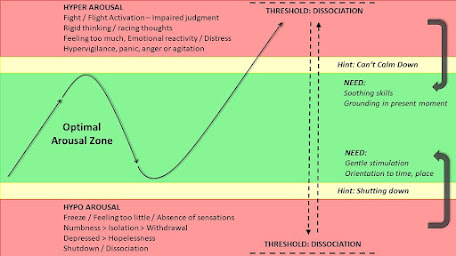As a trauma therapist, I spend a lot of time talking about the "Window of Tolerance." This is a term that was originally coined by Dr. Dan Siegel (who is a really cool guy, you should check him out!).
This metaphorical window represents our capacity to manage stress and emotions effectively. Let's take a deep dive into understanding and working within your Window of Tolerance. We'll explore the concepts of hypoarousal, hyperarousal, and self-regulation and provide techniques to help you stay inside your window, get back in when you drift out, and appreciate the variations in the width of individual windows.
1. Hypoarousal: Freeze response, Shut down, Dissociated
Hypoarousal is the state of being "under-aroused." In this zone, you might feel numb, disconnected, or emotionally shut down. Trauma survivors often experience hypoarousal as a coping mechanism, but it can hinder personal growth. You might experience dissociation in this space, not feeling like you're in your body or that you aren't really here. Some people describe it as feeling "floaty." This is also known as the "freeze" response. We often don't feel motivated to do anything, or maybe we feel like we can't. We're immobilized, in a sense.
Getting Back In the Window:
Grounding Techniques: Engage your senses through activities like breath work,* focus on all five of your senses, or implement some tactile stimulation. I'll sometimes have clients toss me a pillow back and forth when they reach hypoarousal in my office. You have to be in your body to catch a pillow! These strategies can help bring you back into your window.
*When in the hypoaroused state, breath work should be more energetic, faster, and maybe even a bit noisy as opposed to your typical deep breaths. We want to "wake up your nervous system," after all.
Self-Compassion: Be gentle with yourself. Acknowledge that hypoarousal is a valid response to trauma. Self-compassion can help you move towards the center of your window.
2. Hyperarousal: When You're Overwhelmed
On the opposite end of the spectrum is hyperarousal, where you may feel anxious, irritable, or in a state of fight or flight. This can be exhausting and distressing, especially when it becomes chronic.
Getting Back In the Window:
Breath Awareness: Focused breathing exercises, like diaphragmatic breathing, can help regulate your arousal level and guide you back to your window. Here, we take slow, deep breaths in order to calm the nervous system.
Progressive Muscle Relaxation: This technique involves consciously tensing and relaxing your muscles to reduce tension and stress.
Do Some Math Problems: Yes, I know it's odd. But when you let your brain focus on solving the problem, it naturally reaches a calmer state--getting your prefrontal cortex (the part of your brain responsible for logic, critical thinking, and yes, solving math problems) back online. This has a calming effect, and can support your window of tolerance.
3. Self-Regulation: Finding Balance
Self-regulation is the key to staying within your Window of Tolerance. It's about recognizing your emotional state and applying strategies to maintain that equilibrium.
Techniques for Self-Regulation:
Mindfulness: Regular mindfulness practices help you become more attuned to your emotions, making it easier to stay within your window. Be sure to practice trauma-sensitive mindfulness/meditation practices if you struggle with trauma triggers.
Emotion Regulation Strategies: Identify your personal triggers and implement strategies to manage your emotional responses, such as journaling or talking to a therapist.
Understanding Window Variations
It's important to note that everyone has a different-sized window of tolerance. Trauma can make your window narrower, but you can expand it through therapy and self-care.
Techniques for Widening Your Window:
Trauma-Informed Therapy: Working with a trauma therapist can help you expand your window by addressing the underlying causes of its narrowness.
Respect Your Limits: Recognize that your window may be narrower during times of stress. Be kind to yourself and adjust your expectations accordingly. Forcing yourself to "tough it out" only makes it worse. These nervous system responses are here for a reason--it's your brain doing it's best to keep you safe. There's no working against it. We have to respect those limits in order to widen the window.
Navigating your Window of Tolerance is a journey of self-discovery and healing. Whether you're dealing with hypoarousal, hyperarousal, or learning to self-regulate, the process is about building self-awareness and developing a toolbox of strategies that work for you. Remember that your window is unique, and it may change over time. By working within your window, acknowledging your triggers, and seeking support when needed, you can find a path towards healing and growth on your own terms.

Comments
Post a Comment